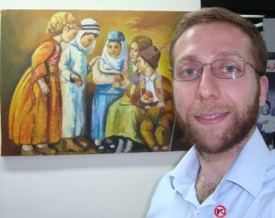Jean-Paul Chami, Peacebuilder
Jean-Paul Chami, Peacebuilder
 LAU’s Summer School for Emerging Leaders in Conflict Prevention and Transformation kicks off next week. The ten-day intensive program, which is sponsored by LAU’s Institute for Peace and Justice Education with support from the Mennonite Central Committee Lebanon (MCC) and Consensus, aims to help students and young people develop the skills of conflict resolution and peacebuilding. We recently caught up with Jean-Paul Chami, a participant in the first Summer School back in 2004, to ask him about his experience with the program and what it has meant to him.
LAU’s Summer School for Emerging Leaders in Conflict Prevention and Transformation kicks off next week. The ten-day intensive program, which is sponsored by LAU’s Institute for Peace and Justice Education with support from the Mennonite Central Committee Lebanon (MCC) and Consensus, aims to help students and young people develop the skills of conflict resolution and peacebuilding. We recently caught up with Jean-Paul Chami, a participant in the first Summer School back in 2004, to ask him about his experience with the program and what it has meant to him.When did you participate in the Summer School for Emerging Leaders in Conflict Prevention and Transformation at LAU and what did you think of the program?
Reflecting back on my experience at the 2004 summer school I come today to the realization that it was definitely a life changing one. The course has taught me a lot. I took part in the first program in the summer of 2004. Back then I realized immediately the importance of the program, the depth of the knowledge provided to us by the trainers and different speaker but most importantly, I was amazed by the high level of maturity of the participants.
The Summer School attempts to connect like-minded individuals who are passionate about conflict resolution and want to gain the skills to help practically implement those skills. How effective is the program at doing that?
Up till today I have been using a lot of what I have learned during the program in 2004 in terms of knowledge and skills, but mainly, in terms of attitudes. The program introduced me to many people in the field with whom I have become good friends and colleagues. The program’s alumni have been in general quite successful in their studies and early careers in the field of peacebuilding and today they form a network that has a lot of potential. Finally, the course introduced me to amazing young people with wonderful leadership attributes who have inspired me with their zeal and determination to change the world.
How important do you think a peacebuilding program like this one is for Lebanon and particularly for the younger generation of Lebanese?
Lebanon is still witnessing many conflicts that can at any point manifest themselves through violence. Consequently, the country needs as many “conflict literate” people as possible, with skills such as conflict analysis and conflict transcendence through creative, constructive and nonviolent conflict approaches. Today we are observing more and more rift among our youth along the fault lines of the polarizing political discourses. We are in desperate need of as many peacebuilding programs and initiatives as possible to prevent the recurrence of violent clashes and to build a generation of young Lebanese capable of playing the role of bridge builders and to bring a harmonizing discourse and unifying practices.
Tell us a bit about your personal experience with the Summer School. How did this experience lead to your own career as peacebuilder?
The course provided me with a solid foundation and good basic understanding of what conflicts are and stirred a vivid interest in me to further my studies in this fascinating new field; which I did by attending the MA in peace and conflict studies at the European Peace University in Austria 2 years later. Today I am running the Peacebuilding and Conflict Resolution program at the Forum for Development, Culture and Dialogue (FDCD) which aims at building local capacities for peace in Lebanon and in Iraq through training and dialogue.
Do you see a bright future for peacebuilding programs like the Summer School?
Absolutely yes, I know that the LAU Summer School will keep being offered for many years to come because I have seen how it has touched and transformed the participants’ lives over the years. Already many graduates of this program have been involved in peacebuilding related activities some becoming trainers others program designers and managers, etc. Soon enough some of the graduates would have piled up sufficient experience and knowledge to contribute back to this program by leading some of the topics and session and even by potentially securing funding for such an initiative to keep being a quality and pioneering tradition much needed in Lebanon.
Latest posts:
- Live Chat with Manal El Tayar on studying at Sciences Po in France
- Live Chat with Salma Abdelnour, author of Jasmine and Fire
- LAU Facebook Cover Photos
- The Appointment of a New Provost
- Dr. Hussein Abbas and Dr. Ahmad Houri, co-authors of the Student’s Guide to Graduate Studies
- Live Chat with LAU President, Dr. Joseph Jabbra
- Prof. Fuad Hashwa and the MEDASTAR Program
- Live Chat with Dr. Mona Haidar on Social Medicine at LAU
- Live chat with Assistant Vice President for Enrollment Management Abdo G. Ghié
- Live Chat with LAU’s Vice President for University Advancement Mr. Richard Rumsey on social media at LAU
- More
Join us on Facebook:


 News and information
News and information Follow us on Twitter
Follow us on Twitter